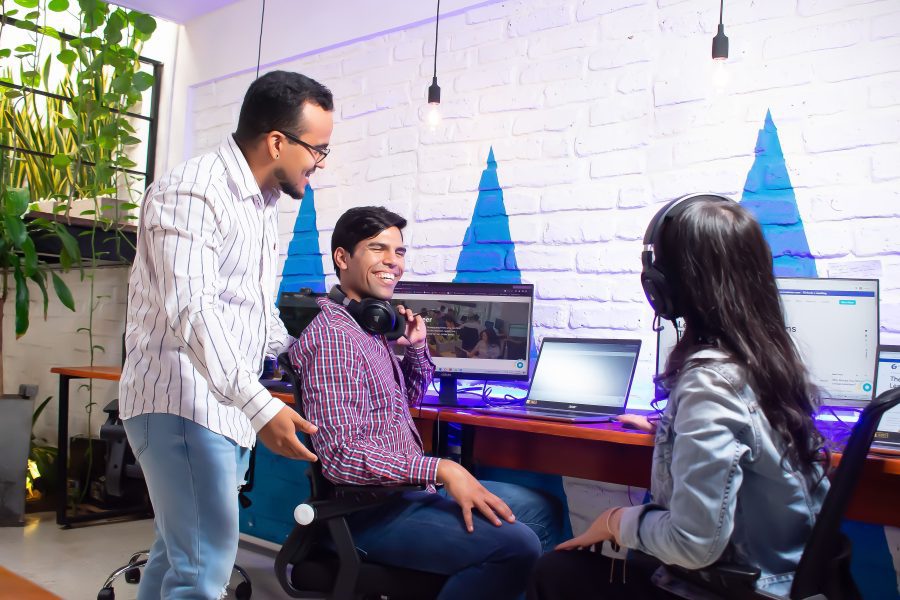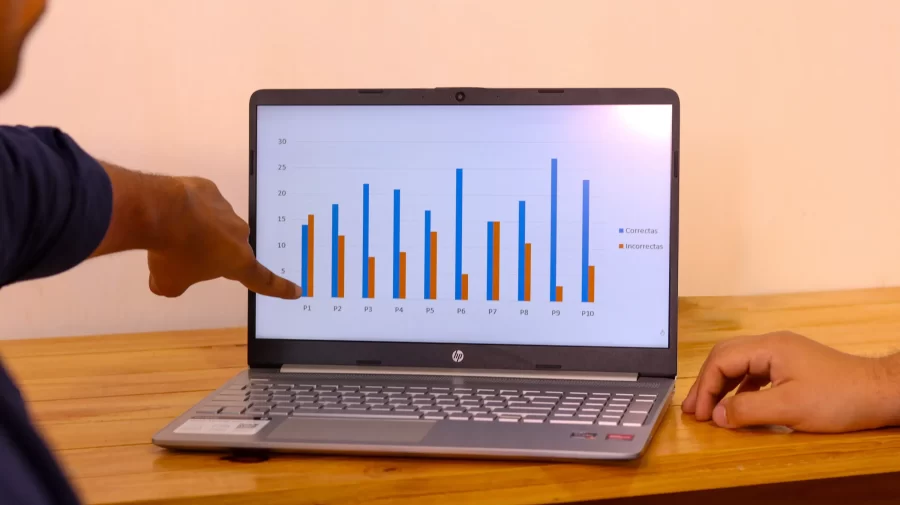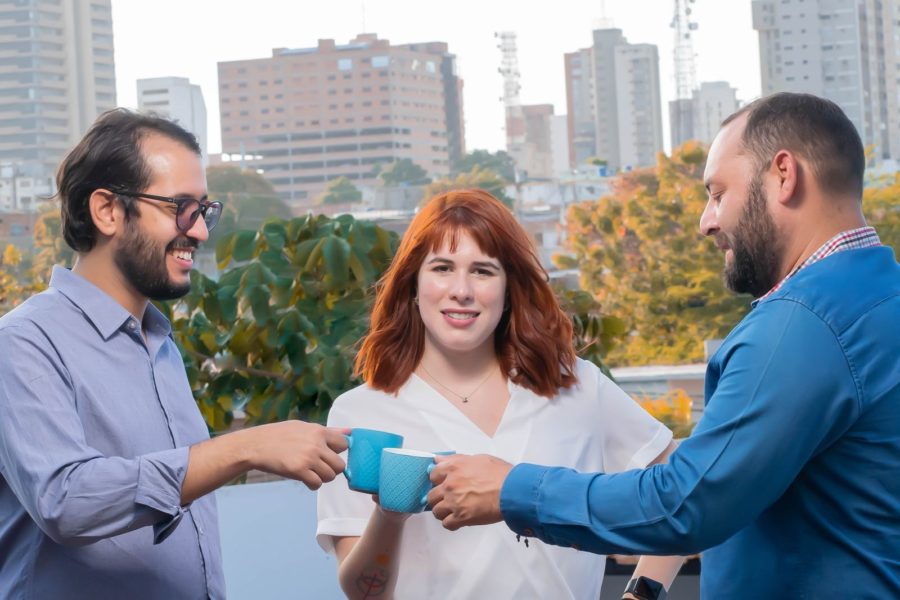Cellphones, computers, laptops, iPads, tablets, etc. As our society keeps technologically improving we get access to many different new devices that include themselves in both our personal and professional lives.

With most jobs shifting to a remote stage, I found it hard at first to draw a distinction between my personal and professional life and I kept thinking about better ways to organize my digital space so that the personal stuff doesn’t distract me while I’m working, and to avoid stressing out about my job when I’m relaxing playing video games or watching a movie.
Just picture this, let’s say one day your manager asks you to send her an important file that you have on your computer ASAP but you don’t remember its name, so you start searching through your files… And to make it worse, when you go to your files you see a bunch of personal docs from college, random downloads, really old pics, everything mixed with the docs from your job. How are you supposed to find the file ASAP?
To be honest, that was me when I started working remotely using my own laptop, and let me tell you, my manager didn’t get that file ASAP… But I at least learned from that experience and started to declutter and organize my own digital spaces.
What will Change after Decluttering Your Digital Space?
It doesn’t matter if you are using it for personal or professional purposes, having a tidy and organized digital space will only bring benefits to you and your devices.
In my experience, decluttering and organizing your files and photos will help you feel less overwhelmed and fatigued. It’s so nice to open up your laptop or unlock your phone and not see tons of random files and apps all over the place.

Cleaning out your devices will also help you be more productive. Once you organize your files and delete the junk you don’t need, it’ll be easier than ever to find those important documents you need for work or college.
Also, a benefit that your computer will appreciate is that by deleting old files, photos, and apps your computer or phone will work faster since it isn’t filled with apps opening in the background and useless files taking up a bunch of necessary space.
Ever thought about why some of your apps are really slow? You might not need a better device, but use the one you currently have more efficiently and make sure that you don’t have a bunch of apps opening in the background.
Finally, the change that I appreciate the most is that I created a boundary between my personal and professional life, so now I don’t get distracted while working with my personal stuff and I don’t get interrupted while resting with work notifications or reminders.
Let me tell you how I did it.
How to Declutter Your Digital Space
1. Organize your emails
If you work remotely like me, emails probably are your main source to receive important information and since we get so much information sent to our emails it can easily get clogged up with many e-newsletters that you never read, promos that you subscribed to 5 years ago, and notifications from who knows where etc.

Those kinds of emails will only work against you and can even make you miss out on important emails that you might have received. So my first tip for you is to take some time to go through your email and start unsubscribing from any e-newsletter or promotion that you know you never read anyways.
This means less stuff clogging up your inbox in the future, and less clearing out of your inbox.
Pro tip: Remember that whether you use Outlook or Gmail they have some great organizing tools that you surely know nothing about, take some time to read about them so you can make the most out of your email inbox.
2. Clean up your desktop
This is what I was talking about at the beginning. I used to have my desktop completely covered by random files I never opened, and that always made it harder for me to spot important files that I needed to use on a daily basis.
To fix this issue, I extremely recommend you to:
- Be ruthless with any file that you don’t use. Drag as many of them to the recycling bin and delete them.
- Uninstall any apps or programs that you don’t need. Your PC will be grateful — This will give you more valuable storage space, and it is likely to improve the speed of the device in question.
- Fix and check your downloads. Many people don’t have a fixed downloads folder, and this is key to quickly finding any file that you just downloaded. Also, it will make it much easier to go through and choose the files that you are going to store in another folder or delete.
- Sort the remaining files by kind, so when the time comes you know exactly where’s what.
- Remove colorful and loud wallpapers. These kinds of wallpapers are, at the of the day, too distracting. I recommend you replace it with a solid background that can help you easily identify the remaining icons on your desktop.

3. Check on apps and notifications
There are two main things you need to focus on when it comes to notifications: Start-up programs and notification pop-ups.
Let’s focus on Start-up programs first.
Whenever you download a new program it is highly likely to open itself whenever you turn on your computer. This ends up making your computer take ages to boot up and then you’ll be bombarded with tons of programs opening themselves and notifications, making your computer slower, and your life a bit more stressful as you close them one by one.
It only takes a few minutes to go through your start-up program list and disable anything that you don’t need to start with your computer. And believe me when I say this: the less you have, the better.

Now, when it comes to notifications, a piece of advice that made my life less stressful is to go through all your notifications on your PC and smartphone and ensure that you are receiving only the absolutely essential ones.
This means saying goodbye to a lot of social media notifications. And trust me, once you do it, there’s no going back.
This will ensure that you are not distracted by anything that’s not important and will help you be more productive when working and have a better rest in your time off. You know that there are some messages that can wait, and if they can wait, it’s better to turn that notification off!
4. Clean up your web browser
There are a lot of things you can do so that your web browser works in your favor, but here are my main ones:
- Use the bookmark bar to work in your favor, put there your daily go-to links so you have easier access to them.
- Routinely remove non-essential websites from your browsing history, delete cookies, and disable or delete any extensions or plugins that you don’t need.
- Make sure to go to your downloads and select a specific downloads folder.
- If you are the type of person to have tons of tabs open at the same time, use group tabs in your favor.
Doing all of this should speed up your web browser — and as a bonus, increase your privacy.
Live a Better Life
At the end of the day, the goal is for you to live a calmer and better life. Your digital space is not another cause for stress, but an amazing tool that will help you be more productive and happier!
So remember to take some time every month or every 2 weeks to keep your devices clean. These tips are a great place to start and I promise you’ll feel so much more organized and productive once you get a handle on your digital clutter!





